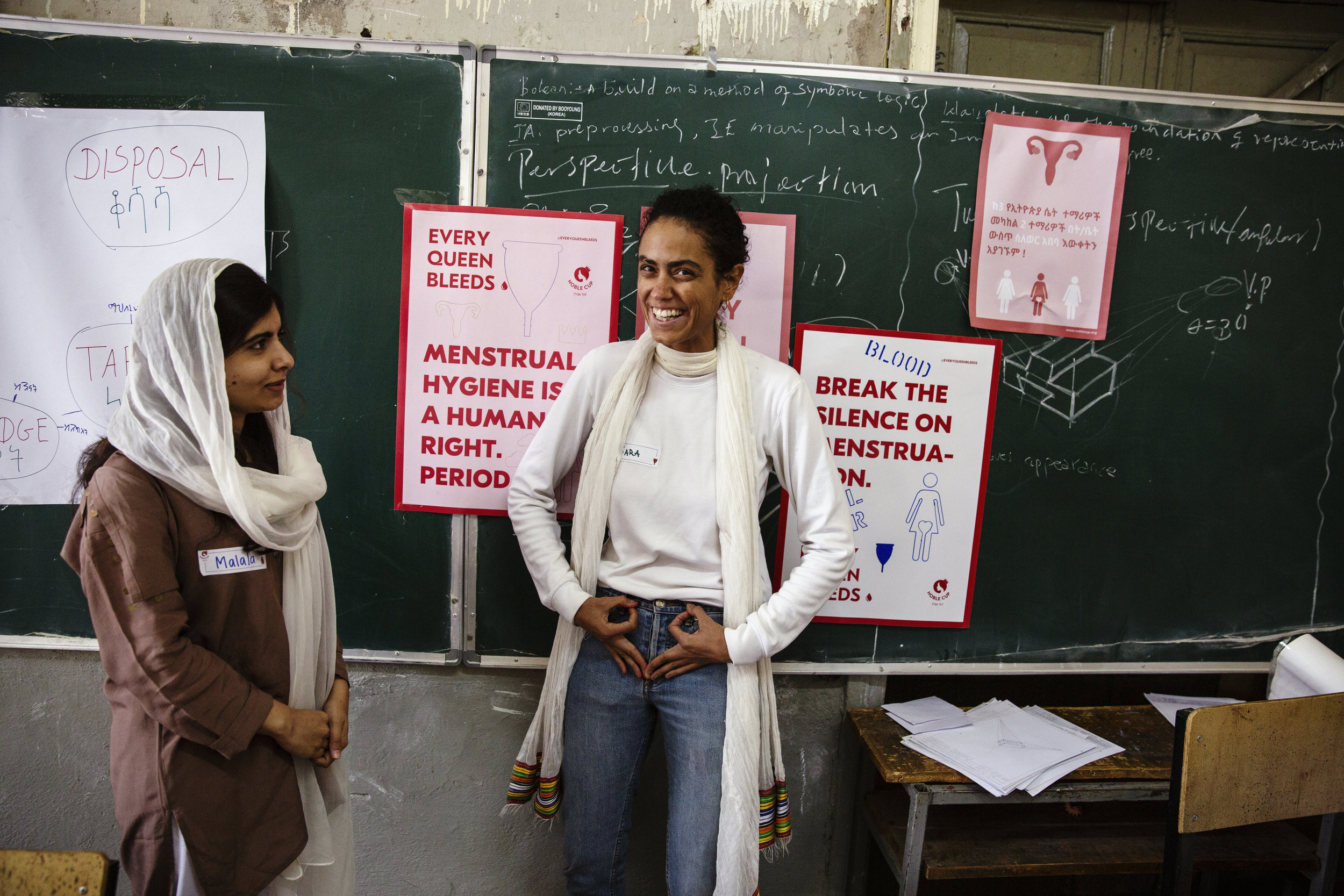Snaps from Ethiopia — a week with Malala in Addis Ababa
(Courtesy of Malin Fezehai / Malala Fund)
A photo essay from Malala Yousafzai’s recent trip to learn from girls and local education advocates.
Hope is high for girls in Ethiopia as headlines point toward progress. School enrolment has doubled in the last quarter century. President Sahle-Work Zewde is inspiring girls as the first female head of state. And women make up half of Prime Minister Abiy Ahmed’s appointed cabinet. But all is not won. More than five million girls remain out of school.
What are the biggest barriers keeping girls out of school? Social norms for one. Ethiopia has one of the highest rates of child marriage in the world — 40% of all girls get married before age 18. The second biggest issue: many schools are not girl-friendly. They lack female staff, clean and private washrooms and curriculums often do not cover important subjects like reproductive health or STEM. Other challenges include poverty, violence and long distances to school.
Research and media coverage only tells us so much. That’s why last week, Malala, her father Ziauddin, U.K. Board Chair Mabel van Oranje and Malala Fund staff travelled to Addis Ababa — the sprawling capital at the base of the Entoto Mountains — to learn directly from girls, mentors and local education advocates about their lives, challenges and the changes they want to see in their country.
Learn more about the girls and organisations we met with in the photo essay below.
Nearly half of Ethiopian girls skip school during their periods because of social taboos and lack of clean facilities or supplies. At a workshop run by Noble Cup, the organsation’s founder Sara Eklund led Malala and a classroom full of girls in a conversation on menstruation. On the agenda: an open discussion about periods, product testing and decorating “Every Queen Bleeds” posters.
Yegna, a popular youth brand in Ethiopia run by Girl Effect, uses music, radio and TV to highlight barriers around girls’ education and offer potential solutions. While in Addis, we toured the set of Yegna’s TV drama, “The Story of Us,” which focuses on the lives of a group of teens (each representing different socioeconomic backgrounds) as they overcome challenges real Ethiopian girls often confront. The show also touches on themes of friendship, gender equality and confidence. After the walk-through, Malala sat down with the show’s cast to discuss the changes they see in their communities as a result of the show. A group of fans who lead Yegna Mini Media after-school clubs to educate their peers on gender equality also joined us for the set visit.
(Courtesy of Malin Fezehai / Malala Fund)
Through textbooks, leadership training, English classes, trips to visit universities, IIE’s Higher Education Readiness scholarship programme prepares high-achieving girls from marginalised communities to transition from secondary school to university. Malala joined one of the programme’s English classes where she heard about girls’ career aspirations — to be judges, economists, doctors. Students also shared what changes they want to see in their country: more schools in rural areas, ending stigma around menstruation and ensuring girls continue learning past grade nine.
(Courtesy of Malin Fezehai / Malala Fund)
Betelhem Dessie started coding at age 10 and is now helping other students in Ethiopia learn the tech skills they need to prepare for a modern workforce. We stopped by Betelhem’s organisation Anyone Can Code to meet her students and learn about their coding projects. Betelhem explained that technology is inaccessible for many girls in Ethiopia. And even when it is, many girls feel society discourages them from pursuing careers in technology or science. She trains girls as young as 8 years old in coding and robotics, and encourages them to study the subjects they want.
(Courtesy of Malin Fezehai / Malala Fund)
Population Council’s Biruh Tesfa provides marginalised young women in Addis Ababa who have little to no education — migrants, domestic labourers, sex workers, those with disabilities — with basic life, literacy and maths skills. Many girls came to the city from rural areas, some with a relative or others with “brokers,” men who had promised them a better life, but instead exploited them. As domestic labourers, girls often earn just $6 after a 64-hour work week. Malala listened to the girls as they shared how education has transformed their lives and what barriers affect girls growing up in rural areas.
The trip helped us gain a better understanding of the barriers to girls’ education in Ethiopia — and how Malala Fund can help address them.
This was just the beginning. We know there is still a lot of work to do to make sure that every girl can go to school. We are glad to have supporters like you with us in this fight.
 Read more
Read more

















